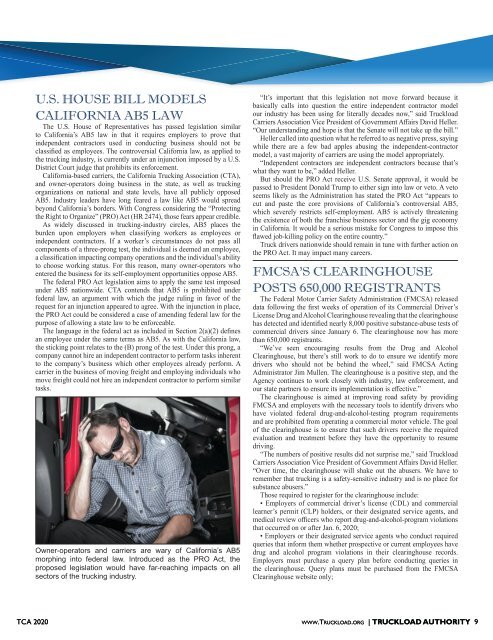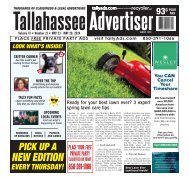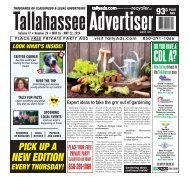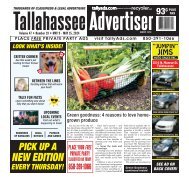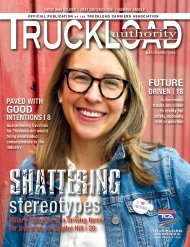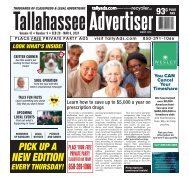TLA42_AllPages
You also want an ePaper? Increase the reach of your titles
YUMPU automatically turns print PDFs into web optimized ePapers that Google loves.
U.S. HOUSE BILL MODELS<br />
CALIFORNIA AB5 LAW<br />
The U.S. House of Representatives has passed legislation similar<br />
to California’s AB5 law in that it requires employers to prove that<br />
independent contractors used in conducting business should not be<br />
classified as employees. The controversial California law, as applied to<br />
the trucking industry, is currently under an injunction imposed by a U.S.<br />
District Court judge that prohibits its enforcement.<br />
California-based carriers, the California Trucking Association (CTA),<br />
and owner-operators doing business in the state, as well as trucking<br />
organizations on national and state levels, have all publicly opposed<br />
AB5. Industry leaders have long feared a law like AB5 would spread<br />
beyond California’s borders. With Congress considering the “Protecting<br />
the Right to Organize” (PRO) Act (HR 2474), those fears appear credible.<br />
As widely discussed in trucking-industry circles, AB5 places the<br />
burden upon employers when classifying workers as employees or<br />
independent contractors. If a worker’s circumstances do not pass all<br />
components of a three-prong test, the individual is deemed an employee,<br />
a classification impacting company operations and the individual’s ability<br />
to choose working status. For this reason, many owner-operators who<br />
entered the business for its self-employment opportunities oppose AB5.<br />
The federal PRO Act legislation aims to apply the same test imposed<br />
under AB5 nationwide. CTA contends that AB5 is prohibited under<br />
federal law, an argument with which the judge ruling in favor of the<br />
request for an injunction appeared to agree. With the injunction in place,<br />
the PRO Act could be considered a case of amending federal law for the<br />
purpose of allowing a state law to be enforceable.<br />
The language in the federal act as included in Section 2(a)(2) defines<br />
an employee under the same terms as AB5. As with the California law,<br />
the sticking point relates to the (B) prong of the test. Under this prong, a<br />
company cannot hire an independent contractor to perform tasks inherent<br />
to the company’s business which other employees already perform. A<br />
carrier in the business of moving freight and employing individuals who<br />
move freight could not hire an independent contractor to perform similar<br />
tasks.<br />
Owner-operators and carriers are wary of California’s AB5<br />
morphing into federal law. Introduced as the PRO Act, the<br />
proposed legislation would have far-reaching impacts on all<br />
sectors of the trucking industry.<br />
“It’s important that this legislation not move forward because it<br />
basically calls into question the entire independent contractor model<br />
our industry has been using for literally decades now,” said Truckload<br />
Carriers Association Vice President of Government Affairs David Heller.<br />
“Our understanding and hope is that the Senate will not take up the bill.”<br />
Heller called into question what he referred to as negative press, saying<br />
while there are a few bad apples abusing the independent-contractor<br />
model, a vast majority of carriers are using the model appropriately.<br />
“Independent contractors are independent contractors because that’s<br />
what they want to be,” added Heller.<br />
But should the PRO Act receive U.S. Senate approval, it would be<br />
passed to President Donald Trump to either sign into law or veto. A veto<br />
seems likely as the Administration has stated the PRO Act “appears to<br />
cut and paste the core provisions of California’s controversial AB5,<br />
which severely restricts self-employment. AB5 is actively threatening<br />
the existence of both the franchise business sector and the gig economy<br />
in California. It would be a serious mistake for Congress to impose this<br />
flawed job-killing policy on the entire country.”<br />
Truck drivers nationwide should remain in tune with further action on<br />
the PRO Act. It may impact many careers.<br />
FMCSA’S CLEARINGHOUSE<br />
POSTS 650,000 REGISTRANTS<br />
The Federal Motor Carrier Safety Administration (FMCSA) released<br />
data following the first weeks of operation of its Commercial Driver’s<br />
License Drug and Alcohol Clearinghouse revealing that the clearinghouse<br />
has detected and identified nearly 8,000 positive substance-abuse tests of<br />
commercial drivers since January 6. The clearinghouse now has more<br />
than 650,000 registrants.<br />
“We’ve seen encouraging results from the Drug and Alcohol<br />
Clearinghouse, but there’s still work to do to ensure we identify more<br />
drivers who should not be behind the wheel,” said FMCSA Acting<br />
Administrator Jim Mullen. The clearinghouse is a positive step, and the<br />
Agency continues to work closely with industry, law enforcement, and<br />
our state partners to ensure its implementation is effective.”<br />
The clearinghouse is aimed at improving road safety by providing<br />
FMCSA and employers with the necessary tools to identify drivers who<br />
have violated federal drug-and-alcohol-testing program requirements<br />
and are prohibited from operating a commercial motor vehicle. The goal<br />
of the clearinghouse is to ensure that such drivers receive the required<br />
evaluation and treatment before they have the opportunity to resume<br />
driving.<br />
“The numbers of positive results did not surprise me,” said Truckload<br />
Carriers Association Vice President of Government Affairs David Heller.<br />
“Over time, the clearinghouse will shake out the abusers. We have to<br />
remember that trucking is a safety-sensitive industry and is no place for<br />
substance abusers.”<br />
Those required to register for the clearinghouse include:<br />
• Employers of commercial driver’s license (CDL) and commercial<br />
learner’s permit (CLP) holders, or their designated service agents, and<br />
medical review officers who report drug-and-alcohol-program violations<br />
that occurred on or after Jan. 6, 2020;<br />
• Employers or their designated service agents who conduct required<br />
queries that inform them whether prospective or current employees have<br />
drug and alcohol program violations in their clearinghouse records.<br />
Employers must purchase a query plan before conducting queries in<br />
the clearinghouse. Query plans must be purchased from the FMCSA<br />
Clearinghouse website only;<br />
TCA 2020 www.Truckload.org | TRUCKLOAD AUTHORITY 9


